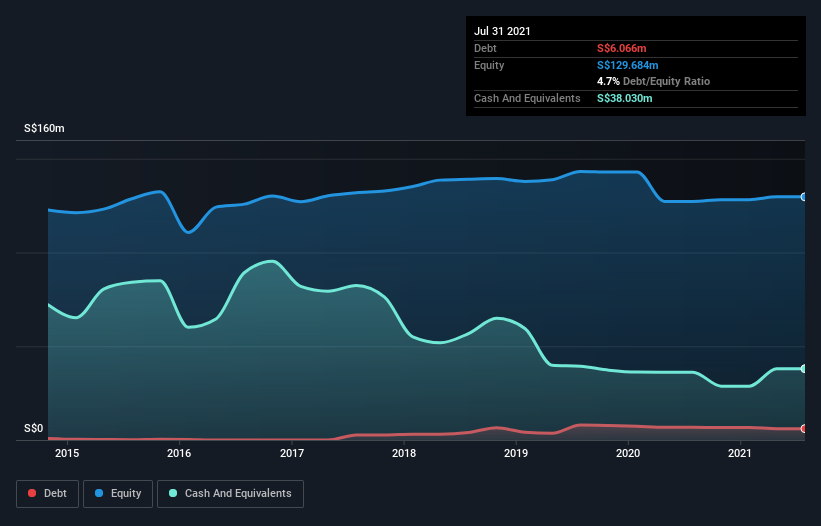Legendary fund manager Li Lu (who Charlie Munger backed) once said, 'The biggest investment risk is not the volatility of prices, but whether you will suffer a permanent loss of capital.' When we think about how risky a company is, we always like to look at its use of debt, since debt overload can lead to ruin. As with many other companies T T J Holdings Limited (SGX:K1Q) makes use of debt. But should shareholders be worried about its use of debt?
When Is Debt A Problem?
Debt is a tool to help businesses grow, but if a business is incapable of paying off its lenders, then it exists at their mercy. Part and parcel of capitalism is the process of 'creative destruction' where failed businesses are mercilessly liquidated by their bankers. However, a more common (but still painful) scenario is that it has to raise new equity capital at a low price, thus permanently diluting shareholders. Of course, the upside of debt is that it often represents cheap capital, especially when it replaces dilution in a company with the ability to reinvest at high rates of return. The first thing to do when considering how much debt a business uses is to look at its cash and debt together.
Check out our latest analysis for T T J Holdings
How Much Debt Does T T J Holdings Carry?
You can click the graphic below for the historical numbers, but it shows that T T J Holdings had S$6.07m of debt in July 2021, down from S$6.74m, one year before. But on the other hand it also has S$38.0m in cash, leading to a S$32.0m net cash position.

How Strong Is T T J Holdings' Balance Sheet?
Zooming in on the latest balance sheet data, we can see that T T J Holdings had liabilities of S$20.9m due within 12 months and liabilities of S$13.6m due beyond that. Offsetting this, it had S$38.0m in cash and S$56.0m in receivables that were due within 12 months. So it can boast S$59.6m more liquid assets than total liabilities.
This surplus liquidity suggests that T T J Holdings' balance sheet could take a hit just as well as Homer Simpson's head can take a punch. On this view, lenders should feel as safe as the beloved of a black-belt karate master. Simply put, the fact that T T J Holdings has more cash than debt is arguably a good indication that it can manage its debt safely.
Although T T J Holdings made a loss at the EBIT level, last year, it was also good to see that it generated S$4.5m in EBIT over the last twelve months. The balance sheet is clearly the area to focus on when you are analysing debt. But it is T T J Holdings's earnings that will influence how the balance sheet holds up in the future. So when considering debt, it's definitely worth looking at the earnings trend. Click here for an interactive snapshot.
Finally, while the tax-man may adore accounting profits, lenders only accept cold hard cash. T T J Holdings may have net cash on the balance sheet, but it is still interesting to look at how well the business converts its earnings before interest and tax (EBIT) to free cash flow, because that will influence both its need for, and its capacity to manage debt. Happily for any shareholders, T T J Holdings actually produced more free cash flow than EBIT over the last year. That sort of strong cash generation warms our hearts like a puppy in a bumblebee suit.
Summing up
While it is always sensible to investigate a company's debt, in this case T T J Holdings has S$32.0m in net cash and a decent-looking balance sheet. The cherry on top was that in converted 101% of that EBIT to free cash flow, bringing in S$4.6m. So we don't think T T J Holdings's use of debt is risky. The balance sheet is clearly the area to focus on when you are analysing debt. But ultimately, every company can contain risks that exist outside of the balance sheet. Case in point: We've spotted 4 warning signs for T T J Holdings you should be aware of, and 1 of them can't be ignored.
If, after all that, you're more interested in a fast growing company with a rock-solid balance sheet, then check out our list of net cash growth stocks without delay.
Valuation is complex, but we're here to simplify it.
Discover if T T J Holdings might be undervalued or overvalued with our detailed analysis, featuring fair value estimates, potential risks, dividends, insider trades, and its financial condition.
Access Free AnalysisThis article by Simply Wall St is general in nature. We provide commentary based on historical data and analyst forecasts only using an unbiased methodology and our articles are not intended to be financial advice. It does not constitute a recommendation to buy or sell any stock, and does not take account of your objectives, or your financial situation. We aim to bring you long-term focused analysis driven by fundamental data. Note that our analysis may not factor in the latest price-sensitive company announcements or qualitative material. Simply Wall St has no position in any stocks mentioned.
Have feedback on this article? Concerned about the content? Get in touch with us directly. Alternatively, email editorial-team (at) simplywallst.com.
About SGX:K1Q
T T J Holdings
T T J Holdings Limited, an investment holding company, engages in the design, supply, fabrication, and erection of various structural steel works in Singapore, Malaysia, and Thailand.
Flawless balance sheet second-rate dividend payer.
Market Insights
Community Narratives



